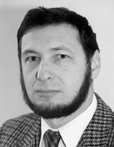 Boris Kagarlitsky
Boris KagarlitskyMost Russian journalists are convinced that an "expert" is any person who has an opinion on a particular subject, regardless of that person's field of expertise.
I am constantly fending off young reporters who request my "expert" commentary on everything from political intrigue in North Korea to the fate of elephants in Burundi. Each of them responds to my protests with bewilderment. "But you're an expert," they say incredulously, "Why not just give me your opinion?"
While Russian journalists quote dozens of pseudo-experts on every question under the sun, the real experts — the professional researchers in their fields of expertise — remain unknown and ignored. The reason is that these people are not "media personalities" and often have trouble composing their words for a general audience. In fact, often their only qualification is that they actually know something about the subject in question. But from many journalists' standpoint, that is more often a liability than an asset. After all, the easiest commentary to sell is one that matches the public's prevailing opinions, the government's official line or the dogma of the liberal opposition. Any analysis that does not conform to these simple templates or shows situations to be complex and resistant to broad generalizations is not only problematic, but even downright dangerous for those who would "shape public opinion."
The problem is that the "expert opinions" that most frequently appear in the media almost always miss the mark and give readers an incorrect understanding of events. The result is that most people are genuinely surprised and confused by the major events unfolding in Russia and abroad.
A perfect example is the view expressed by Russian experts and newspapers regarding the current unrest in Turkey. A leading Internet site published a series of analyses concluding that nothing serious is happening in Turkey and that it will blow over within one week. Another reporter raised concerns that radical Islamists were trying to co-opt the protest movement, apparently unaware that the protesters are speaking out against — not in support of — the growing threat of Islamist influence. What is most alarming is that people with so little awareness of the situation in Turkey are more than willing to offer their "expert opinions," and a leading news portal is equally willing to publish them.
Most Russian commentators argue that there are no grounds for deep-seated discontent in Turkey because the ruling Islamists have successfully carried out liberal reforms. They apparently have trouble grasping that it is the very success of those neoliberal reforms and the accompanying commercialization of education, medical care and other aspects of life that has sparked the widespread discontent.
In Russia, the most popular analyses of any event almost always focus on conspiracy theories. In short, the very people whom we turn to for answers are themselves afflicted with what Nikolai Gogol once referred to as "an extraordinary lightness of thought."
This combination of paranoia, dogmatism and ignorance gives society a picture of reality that is incomplete at best and fundamentally wrong at worst. And such misguided thinking inevitably leads to disastrous consequences. Life has a way of punishing those who would lie to themselves.
Boris Kagarlitsky is the director of the Institute of Globalization Studies.
A Message from The Moscow Times:
Dear readers,
We are facing unprecedented challenges. Russia's Prosecutor General's Office has designated The Moscow Times as an "undesirable" organization, criminalizing our work and putting our staff at risk of prosecution. This follows our earlier unjust labeling as a "foreign agent."
These actions are direct attempts to silence independent journalism in Russia. The authorities claim our work "discredits the decisions of the Russian leadership." We see things differently: we strive to provide accurate, unbiased reporting on Russia.
We, the journalists of The Moscow Times, refuse to be silenced. But to continue our work, we need your help.
Your support, no matter how small, makes a world of difference. If you can, please support us monthly starting from just $2. It's quick to set up, and every contribution makes a significant impact.
By supporting The Moscow Times, you're defending open, independent journalism in the face of repression. Thank you for standing with us.
Remind me later.





